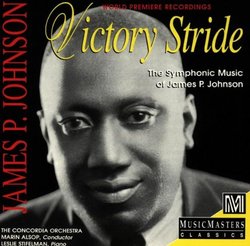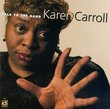| All Artists: Johnson, Alsop, Concordia Orchestra Title: Victory Stride: Symphonic Music of James Johnson Members Wishing: 0 Total Copies: 1 Label: Music Masters Jazz Release Date: 5/10/1994 Genres: Special Interest, Classical Styles: Forms & Genres, Concertos, Instruments, Keyboard, Symphonies Number of Discs: 1 SwapaCD Credits: 1 UPC: 016126714028 |
Search - Johnson, Alsop, Concordia Orchestra :: Victory Stride: Symphonic Music of James Johnson
 | Johnson, Alsop, Concordia Orchestra Victory Stride: Symphonic Music of James Johnson Genres: Special Interest, Classical
![header=[] body=[This CD is available to be requested as disc only.]](/images/attributes/disc.png?v=15401716) ![header=[] body=[This CD is available to be requested with the disc and back insert.]](/images/attributes/disc_back.png?v=15401716) ![header=[] body=[This CD is unavailable to be requested with the disc and front insert at this time.]](/images/attributes/greyed_disc_front.png?v=15401716) ![header=[] body=[This CD is unavailable to be requested with the disc, front and back inserts at this time.]](/images/attributes/greyed_disc_front_back.png?v=15401716) |
Larger Image |
CD DetailsSimilar CDs
|
CD ReviewsForgotten American Classicist B. D. Tutt | London, UK. | 11/13/2001 (4 out of 5 stars) "James P. Johnson is one of the most important and yet least recognised African - American musicians if the 20th century. The leading figure in the Harlem "stride" jazz piano style, he taught Fats Waller and strongly influenced Duke Ellington Count Basie and Thelonious Monk. He composed a series of Broadway hits, including the "Charleston", the song which more than any other epitomised the 1920s. He was the favourite accompanist of leading popular singers Bessie Smith and Ethel Waters, and a prolific recorder of piano rolls. What is less well known is that he also sought (like Scott Joplin) to produce "serious" orchestral music using African American themes and rhythms. A number of these works were performed in his lifetime but were then forgotten, and until the 1980s were considered lost. Researchers then interviewed members of the Johnson family and discovered that they still had manuscripts of a number of these "lost" works. Some of these works are featured on this CD. Probably the best work is "Drums: A Symphonic Poem", an effectively orchestrated and rhythmically powerful piece with a sense of accumulating tension not dissimilar in concept to Ravel's "Bolero". The two extant movements of Johnson's 1934 "Concerto Jazz-A-Mine" are given a good performance. The first movement features a number of piano tricks drawn from Johnson's jazz repertoire, whilst the second movement highlights his gift for romantic melody. The "Harlem Symphony" is a programmatic suite, each of its four movements representing a particular facet of 1930s Harlem. The first movement, "Subway Journey", is intended to show a variety of communities within New York. The second movement, "April in Harlem", is another romantic theme. The third movement, "Night Club", is a jazzy piece, whilst the fourth movement "Baptist Mission", is a set of increasingly impassioned variations on a gospel theme. Johnson's orchestration is not particularly assured here, and at times the effect is reminiscent of a theatre pit band.The weakest pieces are "Victory Stride" and "Charleston", both fillers transcribed from jazz recordings made by Johnson in the 1940s. Go and listen to the originals! Johnson may not have had Gershwin's success as a "serious" composer (although he was his superior as a pianist), but these pieces are still well worth hearing. Marin Alsop and the Concordia Orchestra have championed these works, and along with pianist Leslie Stifelman, they offer a convincing case for reconsidering James P. Johnson as not simply a great popular musician, but also as an unappreciated talent in America's mid 20th century classical music scene.(Incidentally, anyone who enjoyed this disc should hear Johnson playing 20 of his pieces, including "Yamecraw - A Negro Rapsody", the 2nd movement of the piano concerto and an abbreviated piano transcription of "Drums", on Smithsonian / Folkways CD 40812, "The Original James P. Johnson 1942 - 1945")." A must-have for "Third Stream" fans Jonas Muller | Copenhagen | 09/03/2006 (3 out of 5 stars) "For anyone interested in music attempting to combine classical music with black American vernacular music, also often referred to as "Third Stream", a term coined by Gunther Schuller, this CD is an absolute must-have. Victory Stride is a CD containing recordings of American stride-pianist James P. Johnson's rare and little known "symphonic" music. Johnson, mostly known as a stride-pianist and composer of show tunes, wrote symphonies, piano concertos, and an opera, written in European classical style but heavily flavoured with many forms of black American music, similar to what George Gershwin, Aaron Copland and Darius Milhaud were experimenting with at the time. The problem with much of Johnson's symphonic music is that its black music influences are so heavy at times, that it really requires a musician familiar with both classical and blues and jazz sensitivities, usually a rare find. The opening number on the CD, the title number Victory Stride, is a clear example of this problem. The piece is a hard driving big-band-like swing tune but is here performed by classically trained musicians, who, with their lack of feeling and swing, completely misrepresent the tune. Similarly, the piano concerto Concerto Jazzamine, originally premiered with Johnson's stride colleague Fats Waller as the soloist, evidently requires a soloist steeped in both traditions, as was Johnson and Waller. However, Leslie Stifleman, the soloist on the recording makes a noble effort but the piece loses a bit of its strength with her stiffness and lack of rhythmic feel. The most successful pieces on the CD are Harlem Symphony and American Symphonic Suite, two beautifully crafted pieces of symphonic music, which shows Johnson's capability of merging American styles with European romanticism, somewhat similar and just as skilfully and tastefully as his contemporary colleague George Gershwin. Concordia Orchestra, contrary to their performances of Victory Stride and The Charleston, does a surprisingly good job at handling passages unfamiliar to classically trained musicians such as Harlem Symphony's hard swinging third movement Night Club. Contrary to Gershwin and Copland, Johnson, being black, was never accepted as a composer of "serious" music in 1930's segregationist America, and the people that could have helped him, the leaders of the Harlem Renaissance, seemed to have turned their backs against him, probably due to his association with "low-brow" black music and popular music, elements that Renaissance blacks typically scorned. This CD is therefore an important step in attempting to bring Johnson's symphonic music into recognition and acceptance, which he never experienced during his lifetime. " Fascinating surprise and very competent production... William E. Adams | Midland, Texas USA | 05/05/2003 (4 out of 5 stars) "I found this item in a bargain bin recently and took a chance on it because I had heard OF James P. Johnson, but nothing BY him. Well, this does not have his own jazz piano playing from the 1920's on it---there are other available CD's with those recordings. Instead, we get the serious music Mr. Johnson composed after he retired from jazz and musical revues...the stuff a black man could not get played by the large symphony orchestras of the '30's and '40's, whose audiences were overwhelmingly white. On this release, you'll find about 50 minutes of wonderful symphonic composition. I was interested all the way through and will need to hear it again to fully appreciate the art of it. As I write this, there are only two other reviews published on this item, and each contributor is more knowledgeable than I am about music in general and Johnson in particular. I urge you to read those critiques. I would tell you that if you are interested in Johnson himself or in music by African-Americans in general, you need to find a copy of "Victory Stride." The Concordia Orchestra is a NYC-based group, and the members should be proud of having made these long-neglected works available for the 21st century."
|

 Track Listings (10) - Disc #1
Track Listings (10) - Disc #1
